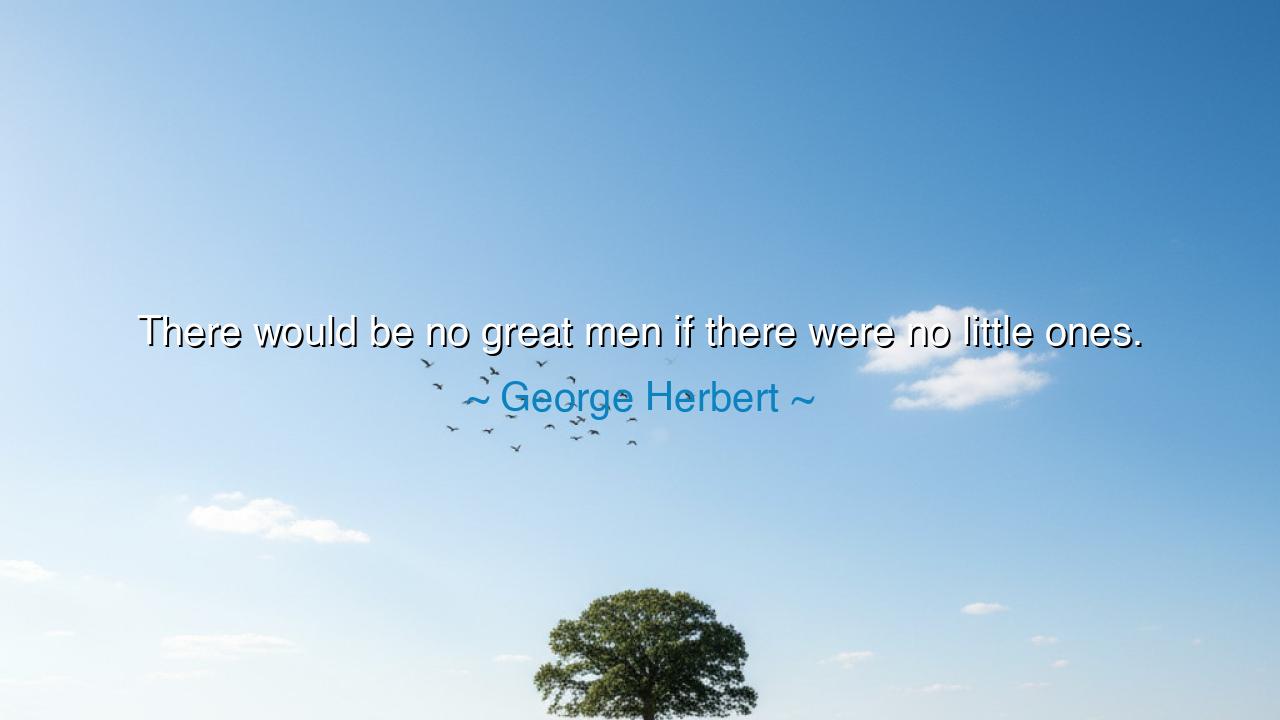
There would be no great men if there were no little ones.






Hearken, children of the ages yet to come, and ponder the timeless words of George Herbert, who declared: “There would be no great men if there were no little ones.” Within this simple phrase lies a profound meditation on humility, interdependence, and the foundations of greatness, teaching that even the most exalted souls arise upon the labors, guidance, and presence of those who came before, those who support, nurture, and sustain the world in ways often unseen.
Herbert’s insight reminds us that greatness is never solitary. The ancients understood that no hero, philosopher, or ruler achieves renown in isolation. Socrates owed his wisdom to teachers and peers; Alexander the Great depended on generals, soldiers, and craftsmen alike. Every towering figure stands upon the shoulders of countless others, whose “littleness” is not weakness, but the essential groundwork for enduring achievement.
Consider the story of Isaac Newton, whose monumental discoveries in mathematics and physics were made possible not only by his own brilliance, but by the accumulated knowledge of Copernicus, Kepler, and Galileo. The “little ones,” the thinkers and experimenters who preceded him, created the fertile ground upon which Newton’s genius could flourish. Herbert’s teaching illuminates this eternal truth: greatness grows from the foundation laid by the humble, the diligent, and the unnoticed.
The phrase also carries a moral lesson: humility is the companion of greatness. To recognize the contributions of others, no matter how seemingly small, is to honor the interconnectedness of human endeavor. The ancients, from the architects of Athens to the builders of Roman roads, celebrated that even modest acts contribute to the triumphs of history. Without the ordinary hands, thoughts, and sacrifices, extraordinary achievement would wither, for greatness is woven from countless threads, each essential.
Even in times of war and conquest, this principle holds. The Spartans’ valor at Thermopylae, though immortalized by kings and generals, relied upon the courage and discipline of ordinary soldiers, their steadfastness forming the crucible for heroic legacy. Herbert’s words remind us that the little, often unseen efforts give rise to the extraordinary, and that to honor greatness is to honor the countless small contributions upon which it rests.
From this reflection emerges a timeless lesson: greatness is inseparable from the many who support it, and humility in the presence of achievement is the mark of wisdom. Recognize that your actions, however modest, contribute to the fabric of human endeavor. To build, create, teach, or serve—even quietly—is to lay the foundation for the triumphs of others. Herbert teaches that every act, no matter how small, is a seed of enduring greatness.
Practical guidance flows naturally: perform your duties with diligence, act with integrity, and acknowledge the contributions of those around you. Seek to uplift others, knowing that your efforts, while seemingly small, may enable the towering achievements of another. In doing so, you participate in the eternal chain that binds generations, linking the ordinary and extraordinary in a continuum of human endeavor.
Children of the ages, let George Herbert’s teaching illuminate your hearts: greatness is never isolated, and the hero shines not alone, but upon the foundation of countless unseen acts. Honor the “little ones” in your life and labor faithfully in your own sphere, for it is through the union of ordinary and extraordinary efforts that humanity ascends, and it is in this recognition that wisdom, gratitude, and enduring achievement are born.
If you wish, I can also craft a more narrative, evocative version, illustrating the ordinary and extraordinary through imagery of builders, scholars, and heroes, turning Herbert’s teaching into a vivid oral lesson for storytelling. Do you want me to do that?






AAdministratorAdministrator
Welcome, honored guests. Please leave a comment, we will respond soon